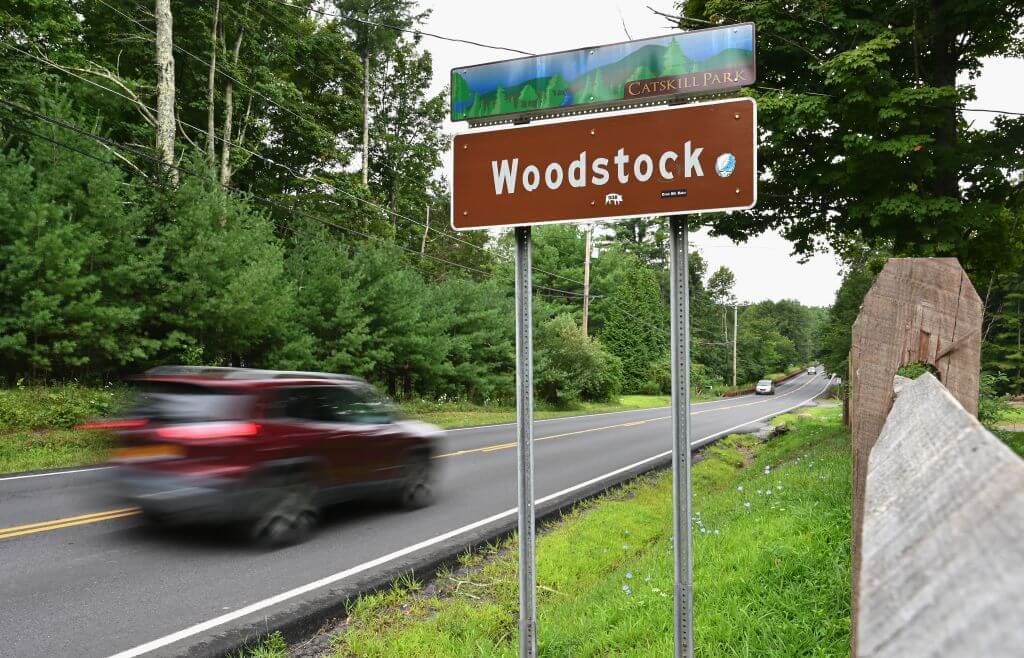Woodstock synagogue says planned ‘glamping’ site would dirty a pond used as a mikvah
Concerns over sewage has congregation questioning planned high-end camping facility

A synagogue in Woodstock, N.Y., is pushing back against a planned ‘glamping’ site, saying current plans would have wastewater running into a pond used as a mikvah. Photo by Angela Weiss/AFP via Getty Images
A New York synagogue is pushing back against plans for a “glamping” site, saying that as it stands, it would ruin a pond the congregation uses as a mikvah.
The Woodstock Jewish Congregation, which serves roughly 350 households, has been in its current location since 2006. During that time, executive director Rahel Gruenberg said the congregation has used the pond a handful of times as part of the rituals involved in converting to Judaism and also for the Rosh Hashanah ritual of tashlich, in which breadcrumbs are thrown into a body of water to symbolize the casting off of sins.
According to Judaic law, a naturally occurring body of water, such as a pond, lake or ocean, can serve as a mikvah. But two weeks ago, Gruenberg said the synagogue was contacted by the area’s planning board to inform them of plans to develop a nearby 77-acre tract of land into a high-end camping site that would house 75 tents, a swimming pool and other accommodations. The site is currently untouched forest.
On its website, the developer of the proposed project, Terramor, describes a site it runs in Bar Harbor, Maine, as having the “romance of a camping adventure blended with the amenities of a resort.”
But Gruenberg said that while guests may get treated to a high-end experience, the site will cause nothing but problems for locals. At a planning board meeting on Tuesday night, she said it was revealed that Terramor’s plan involved treating sewage from the facility’s septic tank onsite and then draining it into the pond. During the meeting, a request was made to have a state environmental quality review conducted into the issue.
“As of now, what I learned last night is either their effluent is going to go into our stream and our pond, or into another neighbor’s,” said Gruenberg.
She added that the synagogue’s board is still collecting and evaluating information but “we feel confident they should do a full environmental impact study, including the impact on local traffic.” She added: “We just need to know a little more about what’s going on.”
In a statement sent to the Forward, a Terramor spokesperson said they are taking the religious significance of the pond seriously and has notified the synagogue that they are “reviewing alternative solutions to avoid any perceived impacts to the congregation’s pond.”
“Our team is currently exploring several different options to manage the treated wastewater in accordance with all applicable regulations. This will be provided to the Town of Saugerties as we continue to respond to comments from the Planning Board and members of the public.”
The synagogue’s congregants are not the only locals concerned about the site. A group calling itself Citizens Against Terramor has popped up in opposition. “A resort does not belong in a community,” they say on their website, which lays out a number of grievances, including potential hazards related to traffic intersections, air quality, fire risk, wetland and wildlife habitat loss and other quality of life concerns.
A message from our CEO & publisher Rachel Fishman Feddersen
I hope you appreciated this article. Before you go, I’d like to ask you to please support the Forward’s award-winning, nonprofit journalism during this critical time.
We’ve set a goal to raise $260,000 by December 31. That’s an ambitious goal, but one that will give us the resources we need to invest in the high quality news, opinion, analysis and cultural coverage that isn’t available anywhere else.
If you feel inspired to make an impact, now is the time to give something back. Join us as a member at your most generous level.
— Rachel Fishman Feddersen, Publisher and CEO